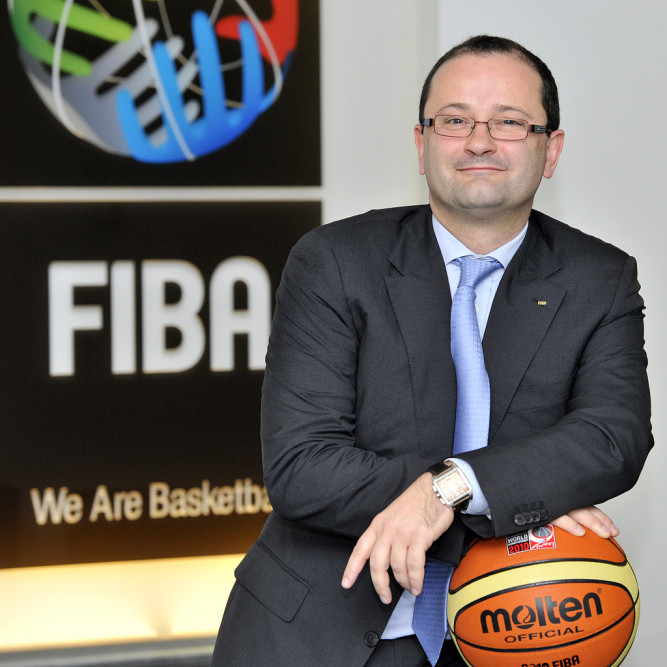
The weeks continue to be tense behind the scenes, with only smidgen and guesses have been truly learned, the powers that be in European basketball are playing a most dangerous game.
Nobody knows the hand Patrick Baumann is willing to play. Would FIBA’s secretary general really gamble that crushing sanctions on national federations would be enough to make Europe’s top clubs, or even the important middle tier, break ranks? Would it be worth the long-term damage to relationships?
Or, and this is quite an important alternative, could Baumann actually have a hand strong enough to win over those clubs without such threats?
Given who has been invited to what meeting so far, the latter seems unlikely and the former remains unnerving.
Brinkmanship is wholly dependent on one side yielding or at least backing down in the face of an unimaginable outcome but for that to happen one of these sides needs motivation to avoid that outcome.
Look at the players. On the incumbent side we have Jordi Bertomeu leading an apparent united front on the Euroleague side. Barcelona, Real Madrid, Olympiacos, CSKA, Fenerbahce, and Anadolu Efes have rowed in behind Bertomeu and Eurohoops reports that Panathinaikos and Maccabi Tel Aviv, the two premier clubs seen as most open to at least considering a FIBA offer, have backed Bertomeu as well. That’s a serious amount of clout but the story gets a touch more complex when down a level.
Yet united as this front is, and the letter distributed by Euroleague would indicate a powerful lobby, it hasn’t stopped Baumann meeting the power brokes of Barcelona and Real Madrid. With rumours that FIBA will offer a whopping €150 million package in a new Euroleague, money could talk but the cash has to be real and that’s a long way from being clear.
The Russian clubs will do as CSKA leads, they are far more dependent on the Red Army than any other group. The current ABA Liga clubs have little reason to like FIBA right now after the governing body announced it was removing approval of the league. That puts Crvena Zvezda, Partizan, Cibona, and Cedevita all squarely in the Euroleague camp for now.
The Italian, German, and French clubs however are a different story. As it stands, none of these leagues have teams at the top table but their markets are of huge importance to both bodies. FC Bayern have been courted so heavily by Euroleague since rising to the Bundesliga that they have to be favoured to be in the incumbent camp, likewise Alba Berlin and Brose Baskets Bamberg would rather avoid splitting the Bundesliga line, but what of Olimpia Milano and whoever Pro A sends through next season? They certainly look more pliable but with such a united front at the top end, these clubs are likely to row in behind the bigger clubs.
Then there is the matter of Lithuania. While the overall cache of international hoops is debatable, FIBA certainly can’t be compared to FIFA in terms of influence, there’s no question that the Lithuanian national team is a really big deal in Lithuania and the actions of Zalgiris and/or Lietuvos Rytas over the next few months will be telling. If Lithuania secures a spot in the Olympics or even the Olympic Qualifying Tournament…well suffice to say the media over there will take this whole power struggle awfully seriously.
All the while none of these clubs had any representation at FIBA’s own meetings last month discussing the future of the club game in European basketball. FIBA has hinted at using next season’s Eurochallenge as a test bed for its new plan (for American readers, think of the NIT trialling out the 30 second shot clock only with way more at stake).
Instead FIBA is primarily, save for those meetings with the Spanish giants, working its home constituency of the national governing bodies. They are looking at using these groups to influence the clubs by essentially beating them over the head with threats that staying in Euroleague means losing support of federations. That’s not going to trouble the top dogs but politically it is a powerful weapon.
It’s also a dangerous one because if it doesn’t work there is only one outcome. A repeat of the two competing leagues season from 15 years ago where Europe had two champions and everybody suffered. Actually that’s not quite right, it’s that outcome plus the prospect of multiple national teams being essentially pariahs, clubs and federations at constant war, and fans utterly frustrated by political bickering that prevents the progress and development of the sport on the continent.
The €150 million figure is important on many levels. For starters, even if it’s a work of creative hope and not actual cash it is the first sign that FIBA is taking an approach other than do as we say with the clubs. Still, at this point they have to do more than point to potential cash that money has to be real and sustainable to make up for the damage already done. Baumann playing the strong-arm hand has clearly rubbed many clubs the wrong way and he needs to give them a carrot. The problem is that for all the financial success of the FIBA World Cup, quintupling Euroleague payouts from current levels is going to require some serious work. Even if FIBA found a way to make it work in the short term, clubs would still be wary of trading loss of power for little real boost in the long-term.
As it stands the Euroleague and EuroCup as we currently know will certainly go ahead next season under the current control. It’s also near impossible for any of Baumann’s moves to take effect in time for the 2016/17 season. Just because the issue is delayed, it doesn’t mean it is going away but time also gives Bertomeu room to strike back. So far he’s played it smart and close. The current governing body has a far less ambitious but more achievable goal of doubling revenues for clubs. He essentially has 18 months to prove he can deliver, that is prove he can not actually deliver. Bertomeu has already got the trust of the power brokers, his job is to not lose it. That may be a defensive position but one that is far more manageable, particularly without the same financial arsenal as Baumann.
All of this politicking however misses the wider point. Any fight, protracted or otherwise, is really bad for the sport. Fans, by and large, don’t care for civil wars all they want is a clear way to understand how their team wins everything and are undeniably the best there is. When their teams don’t do that, they have the hope of the season after. They want to know how they go about winning everything that season without wondering what shape or form the whole matter is going to take. If you want to see how much such debates and strife can irritate casual punters, just talk to any rugby fan about its power struggle last season to essentially change governing body and keep the same competition. It was a mess, it annoyed everyone, and in the end not a whole lot changed except fans got really annoyed that the people in charge couldn’t solve matters quickly.




Leave a Reply